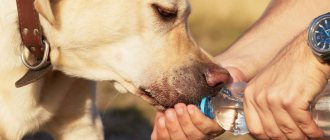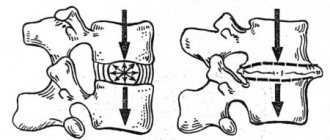The article was finalized and certified
Dubovitsky Yuri Igorevich
Veterinarian
Ask a Question
Dogs cannot tell their owners about health problems using words, and therefore people have to learn to recognize the health status of their pets by their appetite, the quality of their skin and coat, and their level of activity. Any owner should be wary, for example, if the dog has become lethargic, because in most cases this indicates that the animal has serious health problems.
What is lethargy in dogs?
Lethargy (depression) means lethargy, drowsiness, or lethargy.
A lethargic dog may not be interested in going for a walk, even if it is unusual for him, or he may not want to eat or play. Sometimes depression in dogs can be caused by changes in the weather, perhaps being very hot or tired after a very long walk. But it could also be the first sign that something is wrong with your dog.
Lethargy, weakness and sudden fatigue are common signs of a huge number of illnesses in dogs, but these symptoms themselves are quite vague and subjective - many different problems can make your dog lethargic and weak.
When to contact a veterinarian
If your pet has other signs besides drowsiness - vomiting, diarrhea, fever, the animal may tremble, and these symptoms persist for more than 2 days, you should immediately contact a veterinarian.
Lethargy in a pet and ignoring its favorite food is a reason to be wary. You should contact a veterinarian if the animal has a number of other signs indicating the presence of pathological processes, or if lethargy does not go away within several days.
What should I do if my dog is lethargic?
If your dog is older or older, he may gradually become more lethargic as he ages. Lethargy may be due to osteoarthritis or other age-related conditions that cause pain or exercise intolerance.
If your dog is younger but suddenly begins to appear weak, lethargic, and lethargic, there may be a more serious problem. This is especially true if it is accompanied by a refusal to eat or drink. In any case, you should contact your veterinarian for advice or, if they don't have time and you feel it is an emergency, take your pet to your nearest veterinary clinic or 24-hour hospital immediately.
Gastrointestinal disorders
Your pet's sudden weight loss may be a symptom of numerous gastrointestinal (GIT) diseases that affect the functioning of the intestines and stomach. In addition, there may be other symptoms that you should pay attention to, namely:
- constipation or chronic diarrhea;
- regular vomiting;
- dehydration;
- generally sluggish state.
With diseases of the gastrointestinal tract, the animal loses its appetite, which naturally leads to weight loss, since the process of digesting food causes discomfort in it.
Why does my dog seem lethargic?
There are several reasons why your dog may appear tired and lethargic.
The most common causes of lethargy in dogs are:
- Infections including parvovirus, distemper, kennel cough and leptospirosis
- Metabolic diseases - obesity, dystrophy
- Heart problems
- Liver problems
- Diabetes mellitus and, conversely, hypoglycemia
- Medicines for fleas or worms
- Use of antidepressants
- Anemia, which is often caused by parasites such as fleas or intestinal parasites
- Food poisoning such as garlic and onions
- Pain, trauma, diarrhea, hypothyroidism, tumors
- Absolutely any disease
Lethargy as a sign of illness
There is no cause for concern if the dog is sad and lethargic for a short time, say, due to fatigue, but its appetite and stool are normal. But if, in addition to lethargy, there are other alarming symptoms, then you need to quickly arrange an appointment with a veterinarian. The most common causes of weakness in animals are:
- Pain
[2]. If the animal is not only inactive, but also tucks its tail and trembles, does not allow its owner to touch itself and growls, one may suspect that it is in pain. And there are plenty of reasons for this: wounds from bites and burns, various diseases of internal organs, parasitic infestations, and so on; - Stress
[1] is another reason why a dog is lethargic and indifferent to everything that interested him before. Moreover, periods of apathy can be replaced by strong excitement, when the animal constantly barks, howls, ignores the owner’s commands, and may even growl. Under stress, there are often cases of damage to the owner’s things, marks and piles may appear in the wrong places, a perversion of appetite, aimless wandering around the house; - Poisoning
[2]. Lethargy in a dog can be caused by eating spoiled or poisoned food, inhaling toxic fumes, the penetration of snake or spider venom into the body, or taking certain medications. At first, the poisoned animal is worried, but gradually weakens, its breathing becomes noisy, vomiting or diarrhea may be present, the temperature drops or rises, saliva runs from the mouth, convulsions occur, the mucous membranes change their usual shade (turn pale, blue or red). The animal may lose consciousness; - Infectious diseases
[2]. Almost always, a dog does not eat and is lethargic when there is a viral (adenovirus type 1 and 2, canine distemper, etc.), bacterial (leptospirosis, salmonellosis, borreliosis, clostridiosis, etc.) or fungal (dermatophytosis) infection of the body. There are many symptoms of the listed diseases, they vary depending on the type of pathogen that provoked the disease. But whenever there is an infection, the dog refuses to eat and play; - Oral diseases
. The dog is lethargic and does not drink (or drinks, but very little), and also refuses food if it has one of the following diseases: stomatitis, gingivitis, periodontal disease. With such ailments, the animal’s gums are swollen and red, an unpleasant odor emanates from the mouth, saliva runs (with or without blood), the fur in the neck area is constantly wet, there may be ulcers on the oral mucosa, and plaque on the tongue; - Oncology
[1]. The development of a malignant tumor almost always causes the animal to become lethargic and constantly sleep. The pet's weight decreases, the fur becomes dull and falls out easily. Sometimes, with cancer in the later stages, the animal whines pitifully; - Diseases of the digestive system
[1]. With gastritis, stomach ulcers, colitis, enteritis, the pet always looks weak, lethargic, eats little, there may be fever, diarrhea (blood or mucus may be present in the stool, feces are smelly), nausea and vomiting, rumbling in the stomach, flatulence. And if there are problems with the liver (hepatitis, fatty hepatosis, etc.), the pet refuses to eat, stops enjoying walks and games, feels nauseous, sometimes vomits, the mucous membranes may turn yellow (the whites of the eyes also become yellow), the dog drinks a lot, the urine becomes dark , the color of feces often changes (from light yellow to greenish), lethargy develops, weight gradually falls; - Diseases of the heart and blood vessels
[2]. With such ailments as, for example, hypertension, myocarditis and ischemia, the dog lies apathetically most of the time due to pain in the sternum, may cough and breathe hoarsely, suffer from shortness of breath, and pulse fluctuations. The mucous membranes turn pale, the limbs often swell, and the animal sometimes feels sick; - Diseases of the musculoskeletal system
. With osteoporosis, arthritis, osteochondrosis and joint dysplasia in dogs, the hind legs give way, lameness of varying degrees appears on the thoracic or pelvic limbs, clumsiness when moving, the animals are apathetic, do not run and walk little (severe pain can even completely immobilize the pet), and their weight grows; - Endocrine diseases
, the most common of which are diabetes mellitus, hypothyroidism and Cushing's syndrome. With such ailments, the dog is weak, drinks a lot and urinates often, eats heavily, but, as a rule, loses weight. With Cushing's syndrome, your pet's abdomen increases in volume. Due to endocrine problems, the fur becomes dull and thin, the skin itches, becomes thinner, and becomes covered with wounds that take a very long time to heal. Dry mouth. There may be problems with carrying a pregnancy, some bitches have a disrupted estrus schedule; - Worms
. Lethargy, fluctuations in appetite (some dogs eat a lot, others refuse food), upset stomach and intestines can be signs that parasites are living in the dog’s body. Other signs of helminthic infestations include cough, deterioration of hair (dullness, disheveledness) and skin (loss of elasticity, dandruff), bad breath, the appearance of mucus and blood in the stool (eggs, worm larvae and even adult worms can be found in the stool) , itching of the anus (the dog rolls on its butt on the floor, bites itself in the anus); - Allergy
. Sneezing, mucus discharge from the nostrils, tearing and redness of the eyes can be due to an allergic reaction to, say, food components, medications, shampoos, flea saliva, dust, mold, pollen. Other allergy symptoms include severe itching of the body (the dog is constantly itching), swelling of various parts of the body, peeling and wounds on the skin from scratches and bites, noisy breathing, decreased appetite and weakness; - Anemia
[2]. Does the dog constantly sleep and even in rare moments of wakefulness looks tired and apathetic? Perhaps the whole point is the development of anemia - a lack of hemoglobin and red blood cells in the blood. With this disease, animals eat little, the dogs' gums are pale. Blood pressure drops and the pulse is high; dizziness is often present, as a result of which the animal walks staggering; - Kidney diseases
[2] (urolithiasis, renal failure, pyelonephritis, glomerulonephritis, etc.). If the pet is lethargic and does not drink water, or drinks more than usual, suffers from swelling and frequent painful urination, it can be assumed that its excretory system is not in order. The main signs of kidney problems include changes in the amount, smell and color of urine (urine comes out less or more than usual, it smells strong and may be bloody), vomiting, pain in the lower back (the dog spends a long time looking for a comfortable position to sleep, complaining whines).
Could guilt or obesity cause lethargy in dogs?
One of the main causes of exercise intolerance and lethargy in dogs
- is obesity. Dogs that are overweight are at greater risk of heart disease, cancer and diabetes, as well as debilitating conditions including arthritis.
Obesity is a serious impediment to your pet's well-being. However, all is not lost if you are concerned about your pet. Many veterinary day practices will provide free weight checks and advice on diet and exercise.
Puppies need plenty of rest. On average they will sleep 15-20 hours a day and this is very important for their healthy development. But during waking hours, puppies should be full of energy. If you have a puppy that is constantly tired and lethargic, you should contact your veterinarian immediately as this is almost certainly a sign of some kind of medical condition. Lethargy is a symptom of a wide range of illnesses that can occur in puppies, including parvovirus, pneumonia, anemia, fever, congenital heart defects and malnutrition.
Infection
Any infection, including serious ones like parvovirus, distemper, kennel cough, leptospirosis and heartworm, can make your dog lethargic.
Parvovirus is spread through feces. Symptoms of parvovanism may include lethargy, vomiting, diarrhea and abdominal pain. Treatment for parvovirus includes aggressive supportive care with fluids, anti-nausea medications, and antibiotics.
Distemper can cause symptoms such as fever, lethargy, discharge from the eyes and nose, and cough. This can cause neurological problems. Signs of distemper are extensive and vary from dog to dog. Treatment may include antibiotics, fluids, and anticonvulsants.
Kennel cough is a contagious respiratory disease. Its most characteristic symptom is a dry signal cough. Dogs with kennel cough may be lethargic and febrile. Treatment may include cough suppressants, antibiotics, and bronchodilators.
Heartworm disease is caused by heartworms, which are transmitted through mosquito bites. Heartworm symptoms may include lethargy, depression, fever and weakness.
Prevention with oral or injected medications is the best option. Treatment of existing disease requires a series of injections and medications, as well as months of strict cellular rest.
Treatment of lethargy in dogs
If you have a depressed dog with signs of lethargy that is not typical of his temperament, you should see a veterinarian.
Doctors at the clinic will most likely perform a thorough clinical examination, as well as ask questions about your dog's recent behavior and past veterinary care, and collect a medical history. The doctor will draw up a list of differential diagnoses based on your medical history and clinical picture. In most cases, diagnostic tests such as blood, urine, and stool tests will be performed to rule out or confirm the likely illness that is causing the depression symptom. Your veterinarian may also perform an X-ray, an ultrasound scan, and an electrocardiogram to check for heart problems.
Diabetes
Unfortunately, this disease is very common among members of the canine family. If the disease is not controlled, the animal may lose weight very quickly. Diabetes is often diagnosed precisely during examination in veterinary clinics, where people turn to for this symptom. In the vast majority of cases, diabetes progresses in older or middle-aged animals, when weight loss itself is a natural phenomenon due to the aging process. If your pet has already reached an impressive age, it is important to be especially careful to ensure that its weight remains stable.
Depression in dogs
Just like people, dogs can suffer from mental health problems such as depression. Depression in dogs is usually caused by major changes in their environment and behavior, such as the loss of their owner or another pet, a child or partner, moving, moving into their home, or indeed, you and your dog moving to a new home. Chronic boredom can also lead to depression in dogs, as well as dermatological problems such as paw licking syndrome.
Signs of depression in dogs may include a less playful mood, less interaction with other dogs, lack of appetite, a less sociable personality, and chewing or licking of paws. Fortunately, as long as they are given plenty of love, care and attention, most dogs will survive depression within a week or two.
^Top
Exocrine pancreatic insufficiency (EPI)
EPI is a very serious disease in which the animal’s body is not able to effectively digest the food it eats because its pancreas cannot produce the digestive enzymes required for this process. In some cases, such enzymes may still be produced, but their quantity is not enough to digest the feed and, therefore, obtain the nutritional components the body needs. This naturally leads to a decrease in the dog’s weight. This disease is also characterized by chronic diarrhea and strong appetite, as the animal tries to replenish the missing energy by consuming food in extremely large volumes.
How to give medicine to a dog
Liquid medicine is easy to give. Fill it into a syringe without a needle, insert it between your pet's teeth, and squeeze out the drug. The dog will definitely swallow the liquid, and with it the healing agent.
If the medicine is in powder form, add it to the minced meat. The animal will happily eat the meat and will not notice the drug.
With hard tablets the situation is more difficult. No dog will voluntarily eat medicine unless it smells delicious. The easiest way to do this is:
- Using the index finger and thumb of one hand, gently open the dog's mouth.
- Carefully and quickly place the pill as close to your throat as possible.
- Close your pet's mouth, lift it up, stroke its throat so that it swallows. Then praise.
- If the dog does not swallow the tablet, blow directly into its mouth. They swallow against their will, and the medicine goes into the digestive tract.
How to give an injection
If you are a pet owner, learn how to give a shot in the dog's thigh or withers. This skill will definitely come in handy in case of poisoning or other diseases that are accompanied by vomiting. Watch the video, ask the veterinarian to show you how and where to give the injection correctly.
The action plan is as follows:
- Draw the syringe into the medicine.
- Mentally select the area on your dog's thigh where you want to give the injection.
- Ask someone at home to hold the dog.
- Administer the medication quickly.
It is more convenient to inject your pet with insulin syringes. They have a shorter and thinner needle.
First aid
Often, a person who finds himself next to a patient does not know what exactly caused the intoxication and what to do in case of drug poisoning. In some cases, the first symptoms can be noticed only a few hours after taking the drugs. But there are several general rules for providing first aid. They are relevant for all severe cases:
- immediately call an ambulance;
- if a person is unconscious, but there is normal breathing and heart rate, it is necessary to lay him on his side;
- If a person is conscious and less than half an hour has passed since taking the medicine, it is necessary to give him a large amount of water and artificially induce vomiting. To do this, you need to press on the root of the tongue. If you do not know what poisoned a person, there is no need to induce vomiting;
- · After vomiting, give the patient a sorbent.
Drug poisoning. First aid for poisoning.
If a person is in serious condition, breathing slows down, the pulse is difficult to palpate, and artificial respiration must be performed. Remember that inaction can have fatal consequences.
It is necessary to show the emergency medicine packaging to the emergency doctors and describe the person’s condition. If you know that a person took alcohol along with the medicine, also tell the doctors about this.
Features of feeding for each type of diagnosed disease in four-legged friends
If cardiovascular failure is detected in a four-legged pet, it is worth changing its diet. The adjustment is aimed at reducing sodium and protein intake and increasing magnesium and potassium. The market is replete with offers of ready-made food for this disease; the owner can only make a responsible choice.
For arthritis, dietary nutrition is prescribed, aimed at reducing the animal's excess weight and strengthening the joints. These foods usually have a reduced amount of carbohydrates and an increased calcium content.
Oral diseases require softening of hard dry food granules. This can be achieved by adding water to the bowl or switching to canned food.
Diseases of the reproductive system require a reduction in the protein content in the feed, as well as the presence of substances that help the easy removal of fluid from the body.
To choose a new diet for your pet, you should consult a veterinarian.











